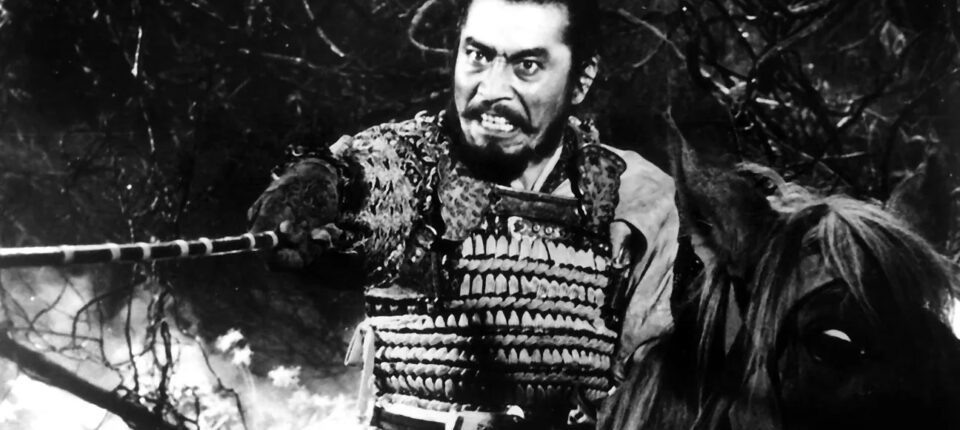Lately, I’ve been in the mood to watch Throne of Blood, the Japanese jidaigeki film directed by Akira Kurosawa. Maybe it’s the wind or the chill in the air or the mysterious fog enveloping Manhattan, but I’ve been longing to be transported, eerily transfixed in the way that Throne of Blood can transport and transfix. Released in Japan in 1957 and released in the United States in 1961, Throne of Blood is based on Macbeth, setting the events in feudal Japan rather than its temporal counterpart in Scotland.
The first man to appear onscreen in the film does not look like a man after he dismounts his frantic horse and thrusts himself against the giant doors of Spider’s Web Castle. He brings urgent news about the front led by Commanders Washizu (Toshiro Mifune) and Miki (Minoru Chiaki), and, flailing against the door, the long feathers protruding from his armor splaying in the squally wind, he resembles a tiny, desperate spider, small and unimportant even though his mission is paramount. The rest of the film turns the purpose of this tiny opening scene into a theme; through a language of insignificance, recurring visual patterns, re-imagined aesthetics, and completely rewritten dialogue, Kurosawa builds on Macbeth’s preoccupation with both the natural world and the nature of existence to further stress the ephemerality, and indeed, the ethereality, of the human lifetime and the meaninglessness of human accomplishment.
Kurosawa begins to discredit human prowess in the very next scene, by contrasting stagnant human life with nature’s continuous flow. In this scene, the first time either Washizu or Miki (the Macbeth and Banquo characters, respectively) appear onscreen, they are riding horses through pouring rain in nearby Spider’s Web Forest on a journey home from a victorious battle, but they keep riding in circles through the woods, much to their confusion. The wood spirit they encounter later in the same scene is spinning thread, another repetitive cyclical movement. In this simple scene, Kurosawa has immediately introduced a concern with cycles; nature doubles back on itself often, to move further, a concept which impatient humans cannot understand, so they are left behind as life moves on.
Kurosawa accompanies this visual illumination of the life’s repetition with a blatant explanation. When Washizu and Miki encounter the witchy wood spirit (Chieko Naniwa), she is singing softly about what she calls “the life of man.” She moans, “A man lives but as briefly as a flower.” This confuses her regal spectators, especially when she says they are “destined all too soon to decay into the stink of flesh. Humanity strives all its days to sear its own flesh in the flames of base desire.” In this lament (which outfits Macbeth just as equally as it fits Throne of Blood) she reinforces that each man lives and dies, while nature only lives on, but she also contrasts the life cycle of nature with the cycle of human death and suffering. Washizu and his fellow warriors (even his supposedly dainty wife) are obsessed with moving ahead in life, regardless that it might lead to the shortening of others’ lives. In Macbeth, life is compared to a “brief candle, a walking shadow, a poor player that struts and frets his hour on the stage and then is heard from no more” and “a tale told by an idiot, full of sound and fury, signifying nothing.” Both stories make the case that human life is too short to contribute to a cycle of death that is already imminent and will undoubtedly arrive earlier than expected.
In this early scene in Throne of Blood, Washizu has not entertained thoughts of committing murder to fulfill the prophecy he has just heard, as is the case with Macbeth, but he has already slaughtered for his country, and therefore contributed to the cycle of death. “All that awaits man at the end of his travails,” the spirit adds, “is the stench of rotting flesh that will yet blossom into flower, its foul odor rendered into sweet perfume” (Kurosawa). Men need to die in order for new life to be created—the anonymity of human death contributes to earth’s vitality, even though human life is shortened in the process. After the wood spirit vanishes, Washizu and Miki stumble upon gigantic piles of tangled human bones—Kurosawa frames these heaps of decomposing people even after the horrified Washizu and Miki walk away, as a resonating reminder that humans are unidentifiable in death, and regardless of accomplishments in life, they will only be able to make positive contributions by rotting.
The wood spirit does not merely degrade human existence with the biological boons of ultimate decomposition but debases human accomplishment by saying that all creatures are equally insignificant. “Men’s lives are as meaningless,” she murmurs, as the soldiers dismount their horses and approach her hut, “as the lives of insects.” Now that they have dismounted their skittish and reluctant horses, they, much like the spidery messenger in the opening shot, are dwarfed by their surroundings—the trees. Furthermore, the padded armor worn by Washizu and Miki appears crunchy, iridescent, and darkly reminiscent of beetle skin. When men in Throne of Blood are riding horses—controlling another life form, let’s say—they are superior, and can be seen as men. But on the ground, awkwardly moving in their thick, shell-like armor, they are debased, and they become bugs.
Kurosawa’s design to turn humans into vermin is particularly noticeable in this scene, as Washizu and Miki are stuck in a spider’s web—or rather, Spider’s Web Forest. The phrase “spider’s web,” uttered four times in a single conversation between Washizu and Miki in this scene, is an invention of screenwriters Hideo Oguni, Shinobu Hashimoto, Ryuzo Kikushima and Akira Kurosawa—nowhere in the text Macbeth are spiders even mentioned. Miki explains that the forest protects Spider’s Web Castle, “stretching out like a spider’s web,” so presumably, the castle was named because of its proximity to the forest, but the fact that there are two sticky spider’s webs in the film presents an interesting take on the many ways a creature can be trapped (Kurosawa). Spider’s Web Forest will not release Washizu, as it is under the power of its own mysterious natural order and the prophetic wood spirit. But Washizu is also trapped by Spider’s Web Castle—once he realizes that such a grand and symbolic home could be his own, he grows obsessed with his potential power, and becomes trapped by his own greed. He becomes stuck to both webs, so much so that he will eventually die because of them—he will be shot by his own army in Spider’s Web Castle when the opposing army charges, disguised as trees using branches from Spider’s Web Forest.
Throne of Blood bases its main theme—the pointlessness of unique human existence—on an exploration of Macbeth’s awareness of the cycles of revenge, greed, murder, and fate, but it also translates the play’s few aesthetic requirements to film to strengthen its argument. The prophecy scenes in Macbeth are dank, foggy, and spooky; and so is this prophecy scene in Throne of Blood. “When shall we meet again?” asks the first witch, in the opening lines of the play. “In thunder, lightning, and in rain?” Later they cackle, “fair is foul, and foul is fair, hover through fog and filthy air.”
The twin scene in Throne of Blood, in which Washizu and Miki stumble upon the spinning forest spirit, features rain, thunder, lightning, and looming fog. Washizu and Miki comment on the inclement weather just as Macbeth and Banquo do, and this foreshadows the sinister tones both works assume. However, Kurosawa’s implementation of identical aesthetics also maintains his motif of diminished human existence not only is the weather so powerful that it is uncontrollable by even the most powerful men. This is a source of frustration for Washizu, who, when he is wet and lost in his own woods, shoots an arrow at the trees as if it will remedy his situation. But more importantly, the wetness it makes their bodies difficult to perceive; among the sheets of rain and fog, Washizu and Miki are barely discernible in the middle of it all.
Throne of Blood, created over three hundred years after Macbeth and halfway across the world, conveys the same timeless warning against human sin, allowing Macbeth to be reborn in a cycle of its own. The story has been rewritten, the language has been changed, the setting has been relocated, and the mechanics have been entirely reinterpreted, but the tortured soul of the play—reverberating with warnings against avarice and violence, capturing the frightful minuteness of mortal existence, and existentially questioning the point of a short, human life—is still very much alive.

















